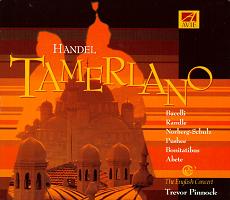
Breach of conventions?
Handel's opera 'Tamerlano'
in a new recording -
investigated by PETER DALE'... absolutely convincing ...'
|

|
Handel's Tamerlano comes from the early 1720s. Newly settled
in Brook Street, he capitalised on the rage for Italian opera (or was it
Italian opera stars? A faintly muddy distinction, even now). First came
Giulio Cesare, then Tamerlano, and then Rodelinda,
all of them great works by any standards.
Tamerlano is something of a curiosity though: effectively, the
opera ends with the death by suicide of the defeated, humiliated Ottoman
Sultan, Bajazet. Tamerlano (Tamburlaine of Marlowe's play) has driven
him to it, and two more suicides look very likely indeed. But the conventions
of opera seria required a happy ending. In principle, Handel conforms.
Ashamed of his actions, Tamerlano reforms and a double wedding is imminent
-- but all this in the very last bars only, and even they close with
with a chorus whose sentiments are up-beat but whose tonality is e minor!
The modern listener has the advantage of not being wrong-footed by this
breach of baroque conventions. That the opera is both seria and essentially
tragic does not bother us.
Continue >>
Copyright © 29 September 2002
Peter Dale, Danbury, Essex, UK

|

